|
|
|
Sort Order |
|
|
|
Items / Page
|
|
|
|
|
|
|
| Srl | Item |
| 1 |
ID:
138926
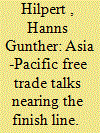

|
|
|
|
|
| Summary/Abstract |
Asia is not only the world’s most dynamic region in terms of trade, it is also an important pacesetter in trade policy. The USA is currently negotiating with 11 partner countries over a Trans-Pacific Partnership (TPP); the members of the ASEAN+6 group are in talks over a Regional Comprehensive Economic Partnership (RCEP), while Japan, China and Korea are conducting trilateral trade negotiations (China-Japan-Korea Free Trade Agreement (CJK FTA)). The multilateral structures emerging from all these initiatives could, in the long term, be combined into a Free Trade Area of the Asia-Pacific (FTAAP). What are the motives behind these agreements? What are their chances of being implemented? When it comes to the trade and geopolitical power struggle that encompasses these talks, does the USA or China have the upper hand? And what role remains for Europe’s trade policy?
|
|
|
|
|
|
|
|
|
|
|
|
|
|
|
|
| 2 |
ID:
179136
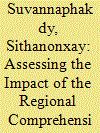

|
|
|
|
|
| Summary/Abstract |
The Regional Comprehensive Economic Partnership (RCEP) is a regionwide free trade agreement (FTA) linking the ten ASEAN economies to their “+5” partners, namely Australia, China, Japan, New Zealand and South Korea. It covers both trade and non-trade related issues ranging from rules of origin and trade facilitation to intellectual property rights and investment. This study examines the likely impact of RCEP on trade alone, taking into account the fact that all its members are already participants in a number of other FTAs. Using latest FTA data from the WTO on imports and exports, this study reveals that tariff reduction under RCEP will erode ASEAN’s trade preferences provided by existing FTA partners, while reallocating import sources of ASEAN countries towards more efficient RCEP partners.
|
|
|
|
|
|
|
|
|
|
|
|
|
|
|
|
| 3 |
ID:
131374
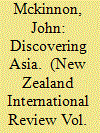

|
|
|
| 4 |
ID:
173182


|
|
|
|
|
| Summary/Abstract |
This article examines Japan’s trade policy on significant geo-economic developments by focusing on its engagement in three large free trade agreements: the Trans-Pacific Partnership, the Regional Comprehensive Economic Partnership, and the Japan–EU Economic Partnership Agreement. Under the Abe administration, Japan has produced successful outcomes in mega-FTA strategy, concluding the Comprehensive and Progressive Agreement for Trans-Pacific Partnership and the Japan–EU Economic Partnership Agreement in 2018. The making and diffusion of high-standard rules were given high priority in Japan’s mega-FTA strategy, and Prime Minister Abe’s political leadership in employing his political allies and executive aides and managing the opposition activities of veto players has enabled his administration to produce these successful outcomes.
|
|
|
|
|
|
|
|
|
|
|
|
|
|
|
|
| 5 |
ID:
155023
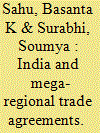

|
|
|
|
|
| Summary/Abstract |
Basanta K Sahu and Soumya Surabhi discuss India’s participation in and the likely effects of some mega-regional trade agreements with a focus on the Trans-Pacific Partnership and the Regional Comprehensive Economic Partnership. Based on in-depth analysis, they highlight some major impacts of the evolving trade agreements and offer time bound roadmaps for India to benefit from them.
|
|
|
|
|
|
|
|
|
|
|
|
|
|
|
|
| 6 |
ID:
131575
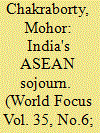

|
|
|
|
|
| Publication |
2014.
|
| Summary/Abstract |
India's economic interactions with the ASEAN region have been an experiment in considerable success, particularly in the backdrop of the signing of the ASEAN-India Free Trade Agreement (AIFTA) in Goods in 2009. While on the one hand, this experience marked a milestone for New Delhi's economic multilateralism with one of the world's most prosperous regions, it constituted the pedestal for its more vigorous engagement with ASEAN, insofar as negotiations for the Regional Comprehensive Economic Partnership (RCEP) are concerned, on the other. A unique ensign of India's economic dynamism in Southeast Asia has been its two-pronged feature: at one level, the conclusion of the FTA (in Goods) with the ASEAN as a whole and the signing of FTA/CECAs (Comprehensive Economic Cooperation Agreement) with individual member-states, at the other. It is in this context that the present article will trace the trajectory of India's economic multilateralism with ASEAN, both at the organizational and bilateral levels (countries with which FTA/CECAs have been signed) and the imperative of concluding the FTA in Services and Investments, so as to reap the holistic benefits of this regional trading arrangement.
|
|
|
|
|
|
|
|
|
|
|
|
|
|
|
|
| 7 |
ID:
149056
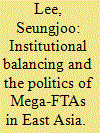

|
|
|
|
|
| Summary/Abstract |
The dynamics of institutional balancing is the predominant factor prompting East Asian countries to move to mega-FTAs. Rather than seeking mega-FTAs purely on the basis of economic benefits, these countries, particularly major powers, have attempted to form mega-FTAs to counter the target state’s vision of the regional architecture.
|
|
|
|
|
|
|
|
|
|
|
|
|
|
|
|
| 8 |
ID:
192164
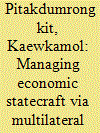

|
|
|
|
|
| Summary/Abstract |
Economic statecraft (ES) has been playing an increased role in affecting the international relations. While armed conflicts decline, states have been weaponising trade, investment, and other economic ties to gain leverage over their counterparts. In the contemporary world, ES is not only used to galvanise countries’ influence in specific issue areas but also part of their grand strategy to achieve broad power-maximisation goals. Despite a proliferation of ES literatures in recent years, extant research tended to focus on great powers’ ES, leaving small states’ ES under-examined. Also, previous studies usually looked into how countries unilaterally employ ES. Hence, insufficient attention has been paid to how regional states work together to collectively alter multilateral frameworks to advance their ES. Against this backdrop, this paper investigates small nations’ roles in the development of multilateral cooperative frameworks. Using the ES lens, it explores how these countries leverage these schemes to push forward their collective ES. The main argument is that regional states worked together to craft the terms of multilateral economic agreements to galvanise their clout over certain governance areas. I validate this argument by using the case of Regional Comprehensive Economic Partnership (RCEP). This study makes contributions to the research pertaining to ES, small states’ strategies, and economic regionalism. It also yields practical implications for policymakers involved in fostering international economic governance.
|
|
|
|
|
|
|
|
|
|
|
|
|
|
|
|
| 9 |
ID:
123988
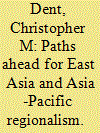

|
|
|
|
|
| Publication |
2013.
|
| Summary/Abstract |
East Asia and the Asia-Pacific are core components of the global economy, and there have been important recent developments in the regionalism of both regions. After the 1997-1998 financial crisis, East Asian countries initiated more exclusive regional cooperation and integration ventures mainly through ASEAN Plus Three, but lately this process has stumbled. The Asia-Pacific Economic Cooperation (APEC) forum has also failed to make substantial progress.
Attention has instead increasingly turned to free trade agreements (FTAs), yet these have hitherto been overwhelmingly bilateral in nature. There are still only a few truly regional FTAs in East Asia and the Asia-Pacific - and these are on a sub-regional scale. However, various frustrations over the messy and fractious pattern of heterogeneous bilateral agreements led to the recent initiation of 'grand regional' FTA talks.
The Trans-Pacific Partnership (TPP) is an Asia-Pacific-based, United States-led project while the Regional Comprehensive Economic Partnership (RCEP) is an East Asia-centred project. Each contains highly diverse memberships and the successful conclusion of TPP and RCEP talks is not assured.
It is argued that, if negotiated, the RCEP is more likely to advance meaningful and effective regionalism than the TPP due to the former ascribing more importance to regional community-building. Furthermore, bilateral FTAs already in force may over the long term transform into more comprehensive economic agreements that address new regional and global challenges such as energy security and climate change.
|
|
|
|
|
|
|
|
|
|
|
|
|
|
|
|
| 10 |
ID:
132038


|
|
|
| 11 |
ID:
142945
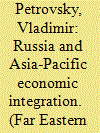

|
|
|
|
|
| Summary/Abstract |
The article examines the prospects for creating an Asia-Pacific Free Trade Area (APFTA), a Regional Comprehensive Economic Partnership (RCEP), and a Transpacific Partnership (TPP). Russia’s participation in negotiations to create a free trade zone and in integration projects in the Asia-Pacific Region is determined by its long-term geoeconomic and geopolitical interests. The latter may be considered the more relevant of the two. They are important not only for Russia’s participation in Asia-Pacific economic integration but for promoting Eurasian integration within the Eurasian Economic Union (EAEU).
|
|
|
|
|
|
|
|
|
|
|
|
|
|
|
|
| 12 |
ID:
140719
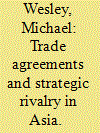

|
|
|
|
|
| Summary/Abstract |
The Asia Pacific is currently beset by two contradictory trends: growing economic interdependence and deepening strategic rivalry. Amidst these trends, new sets of regional trade agreements are being negotiated, primarily the Trans-Pacific Partnership (TPP) and the Regional Comprehensive Economic Partnership (RCEP). This article argues that these proposals represent a third phase of competitive regionalism in the Asia Pacific, which will be more complex than the previous two rounds. This complexity is driven by two factors: this time, rivalry is not over scope or leadership but regional order; and this time there is a greater number of leading players in the rivalry.
|
|
|
|
|
|
|
|
|
|
|
|
|
|
|
|
|
|
|
|
|